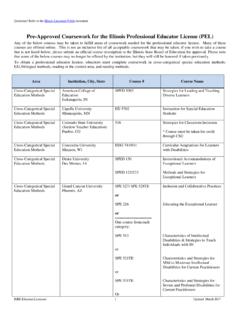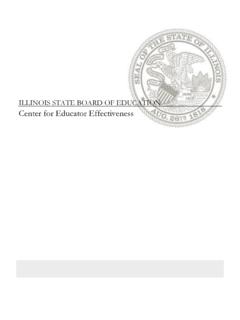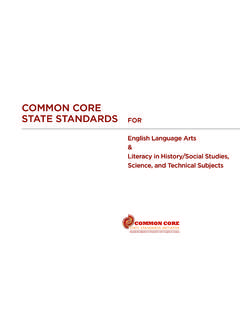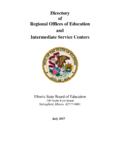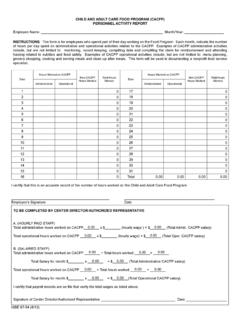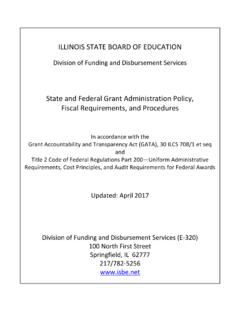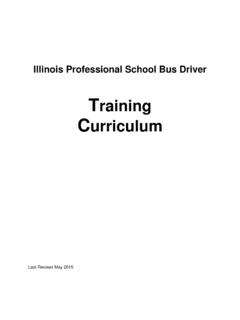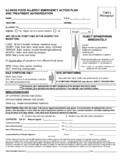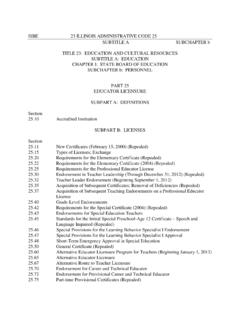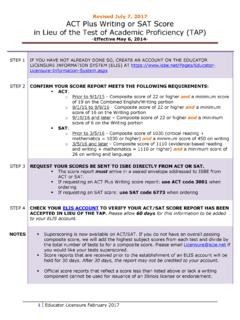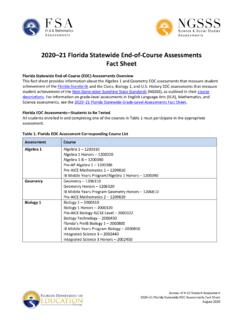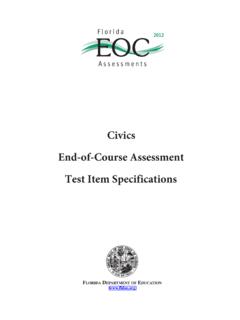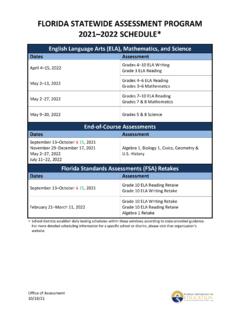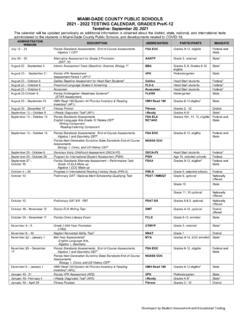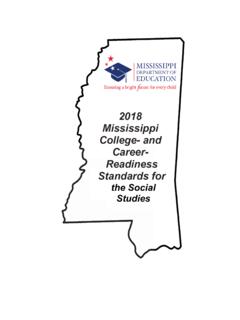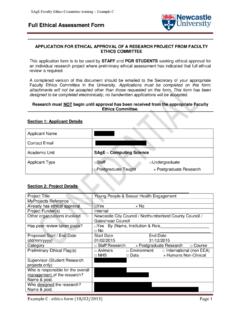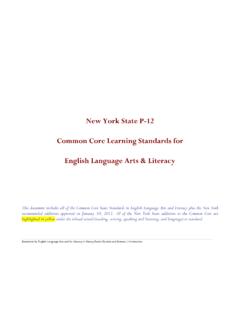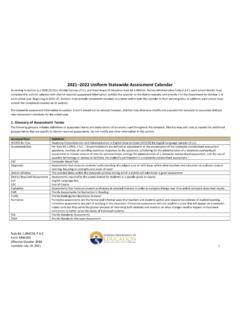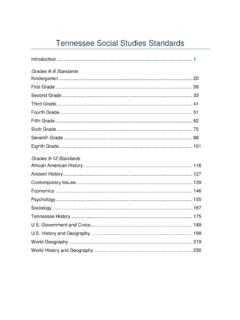Transcription of ILLINOIS SOCIAL SCIENCE STANDARDS
1 ILLINOIS SOCIAL SCIENCE STANDARDS . The ILLINOIS Learning STANDARDS (ILS) define what all students in all ILLINOIS public schools should know and be able to do in the six core areas as a result of their elementary and secondary schooling. The rulemaking became effective on January 27, 2016, and provides that school districts must fully implement the new STANDARDS by the 2017-18 school year. The purpose of these new, more rigorous STANDARDS is to better prepare students to be college and career ready. ISBE College & Career Readiness June 2017. 1. Introduction At its heart, the SOCIAL sciences explore the relationship between individuals and society, from friends and family to global networks. In a school setting, the disciplines of civics , economics, geography, and history are central to our students' preparation for college, career, and civic life.
2 Through the SOCIAL sciences, young people develop skills critical to success in college and careers, including creativity, critical thinking, working in diverse groups to solve complex problems, global awareness, and financial literacy. Most importantly, they will emerge with the knowledge, skills, attitudes, and behaviors necessary to be informed and effective citizens. The task force was constantly challenged with the need for ILLINOIS students to not just acquire and produce knowledge but also to live a life of action to engage in the workings of our democracy. The ILLINOIS SOCIAL SCIENCE STANDARDS are designed to ensure that students across ILLINOIS focus on a common set of STANDARDS that promote the development of the knowledge and skills necessary for success in college, career, and civic life in the 21st century.
3 The vision supporting this design is to produce ILLINOIS graduates who are civically engaged, socially responsible, culturally aware, and financially literate. Teachers can facilitate this process by giving students opportunities to work collaboratively as well as individually. In ILLINOIS , the curriculum is determined locally. School districts offer different SOCIAL SCIENCE courses for their students. The proposed STANDARDS cultivate civic mindedness, historical thinking, economic decision making, geographic reasoning, and psychological and sociological intellect across all disciplines and grade levels. Embedded within a variety of SOCIAL SCIENCE courses, the following STANDARDS do not necessarily require stand-alone courses but do reflect state mandated content.
4 The ILLINOIS SOCIAL SCIENCE STANDARDS presented in this document fall into two complementary categories: inquiry skills and disciplinary concepts. Although they are distinguished in the document, it is expected that they will be used simultaneously. Inquiry skills involve questioning, investigating, reasoning, and responsible action while disciplinary concepts make use of SOCIAL SCIENCE ideas, principles, and content to pursue answers to the questions generated by student inquiries. ISBE College & Career Readiness June 2017. 2. Acknowledgements Development of the draft 21st Century ILLINOIS SOCIAL SCIENCE STANDARDS was a collaborative effort between the ILLINOIS State Board of Education (ISBE), the Robert R. McCormick Foundation, and the Midwest Comprehensive Center (MWCC) at American Institutes for Research (AIR).
5 The SOCIAL SCIENCE STANDARDS Revision Task Force was comprised primarily of classroom practitioners representative of the various SOCIAL studies disciplines, grade bands, and geographic regions of ILLINOIS . A number of ILLINOIS -based universities and SOCIAL studies organizations were also represented on the task force, including the Center for Economic Education at the University of ILLINOIS -Chicago (UIC) and Northern ILLINOIS University (NIU), Center for Global Studies at the University of ILLINOIS (U of I), Chicago Metro History Education Center, DePaul University, Digital Youth Network, Econ ILLINOIS , ILLINOIS Council for the SOCIAL Studies, ILLINOIS State Historical Society, ILLINOIS State University (ISU), and the News Literacy Project.
6 ILLINOIS State Board of Education: SOCIAL SCIENCE STANDARDS Revision Task Force Peter Adams News Literacy Project Hayley Lotspeich American Sociology Association Christine Adrian Jefferson Middle School Jessica Marshall Chicago Public Schools Cheryl Best Wolf Elementary and Middle School Sonia Mathew North Lawndale College Prep High School Amy Bloom ILLINOIS State University Mindy Matthews Farmington Central Elementary School Stephanie Bontemps High Mount School Gayle Mindes DePaul University Seth Brady Naperville Central High School Marty Moe Chicago Public Schools Steven Bruehl Chase Elementary School Michelle Nevin Old Quarry Middle School Dean Cantu ILLINOIS Council for the SOCIAL Studies Carolyn Pereira ILLINOIS Civic Mission Coalition Mary Ellen Daneels Community
7 High School Howard Phillips ILLINOIS Association of School Boards Donald Davis Chicago Teachers Union Eliza Ramirez Zapata Elementary Academy Dustin Day ILLINOIS Principals Association Billson Rasavongxay Glenbard East High School Brendan Duffy Thomas Jefferson Middle School Helen Roberts Center for Economic Education Katie Elvidge Glenwood Middle School Shonda Ronen Hillsboro School District 3. Susan Flickinger Glenbrook South High School Darlene Ruscitti ILLINOIS Association of Regional Superintendents of Schools Terri Hanrahan Plano Community Unit School District 88 Pankaj Sharma Niles North High School Joan Harding Farmington Central Elementary School Jeremie Smith University of ILLINOIS Center for Global Studies Nancy Harrison Econ ILLINOIS Kevin Suess Normal Community High School Mary Beth Henning NIU Center for Economic Education Frank Valadez Chicago Metro History Education Center Christine Hollenkamp Sandoval Elementary School Ben Wellenreiter Morton Junior High School Katie Janovetz Elmwood Junior High School Cara Wiley New Athens Community Unit School District 60.
8 Scott Larson Troy Community Consolidated School District Robyn Williams ILLINOIS State Historical Society Janeen Lee Digital Youth Network Corie Yow Glenwood Intermediate School Stephanie Lerner Chicago Public Schools ISBE College & Career Readiness June 2017. 3. Unique Features of the ILLINOIS SOCIAL SCIENCE Learning STANDARDS Grade-Level Structure The proposed STANDARDS reflect a dramatic shift from the C3 Framework and the work of other states. The task force felt strongly that grade- span STANDARDS at the elementary level resulted in curricula and instructional confusion. It was therefore decided to structure the STANDARDS accordingly: Grade-specific STANDARDS were written for kindergarten, first grade, second grade, third grade, fourth grade, and fifth grade.
9 In contrast, STANDARDS were written for the grade spans of Grades 6 8 and 9 12. Elementary Themes In the last 20 years, the curricular demands on elementary teachers have shifted to a focus on mathematics and English language arts. The task force recognized that thematic lessons often drive many curricular decisions. Authentically trying to find a place for the SOCIAL sciences in a busy school day has resulted, at best, in covering content at worst, in students not being taught SOCIAL studies content at all. Neither of these outcomes works toward the achievement of the levels of citizenship development necessary to sustain and build a healthy democracy. Thus, the task force decided to develop STANDARDS on themes and aligned them to the disciplinary concepts.
10 The themes are: Kindergarten: My SOCIAL World First Grade: Living, Learning, and Working Together Second Grade: Families, Neighborhoods, and Communities Third Grade: Communities Near and Far Fourth Grade: Our State, Our Nation Fifth Grade: Our Nation, Our World Middle School (Grade 6 8) Complexity Levels The middle school STANDARDS are banded by levels of complexity rather than grade levels. Because most SOCIAL SCIENCE classrooms are comprised of a wide array of ability levels and challenges, a complexity continuum was developed to meet the varying cognitive needs of adolescents and to address the range of difficulty of the STANDARDS . Many of the skills addressed in the STANDARDS build on one another. Depending on readiness levels and depth of understanding of the disciplinary concepts, students may move through the complexity levels that are appropriate for their strengths.
